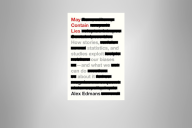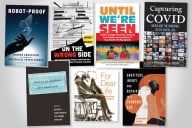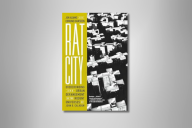You have /5 articles left.
Sign up for a free account or log in.
You can’t judge a book by its cover, as the old saw goes, but every so often the cover art may stun you into long contemplation. Or horror, in the case of Teofilo R. Ruiz’s The Terror of History: On the Uncertainties of Life in Western Civilization (Princeton University Press), which greets the prospective reader by way of Goya’s “Saturn Devouring His Son.”
The ghastliness of the painting never came through when I’d come across it before, in much smaller reproductions, often in black and white. It was inspired by a myth that Freud could have made up, if antiquity had not already obliged. Saturn, having castrated his father (long story), decided to eat his own offspring, which seems like a reasonable precaution given the circumstances. In a familiar version of the story, he swallows the children whole. Tricked into drinking a purgative, Saturn vomits them up and they go on to better things.
Not so in Goya’s rendition. In it, Saturn grasps a headless corpse, pulling away chunks of flesh, bite by bite, with the red insides of the body visible. He is bearded, and he stares at the viewer with a deranged expression while tearing off an arm with his teeth.
The image is unsettling because its grotesquery cuts through gentler versions of the myth to expose a layer of savagery otherwise concealed. Goya’s "Saturn" is part Theodore Kazinski, part Jeffrey Daumer. And, by implication, vice versa: The killers are his avatars. Malevolent craziness seems primordial.
Putting the book down after staring at its cover again, I turn by habit to Google News. It is not a comfort.
In The Terror of History, Ruiz, professor of history, Spanish, and Portuguese at the University of California at Los Angeles, describes and reflects on how people have tried to escape the unending pageant of catastrophe, violence, suffering, and random disorder making up the human condition. Referring to them as “the uncertainties of life in Western civilization” is odd, since things are not appreciably less messed-up elsewhere. Gautama Buddha had pertinent things to say on the matter, some of which Ruiz discusses. (Plus the subtitle inevitably calls to mind the comment Gandhi is supposed to have made when asked for his opinion of Western civilization: “I think it would be a good idea.”)
But most of Ruiz’s cultural references come from European and American sources, and the image from Goya serves to anchor his meditations in the Greco-Roman past. “It is a pictorial representation of one of Ancient Greece’s most telling myths,” he writes. “The god Chronos (time) devours his children out of fear that, as fate has predicted, one of them will overthrow him. And so does Chronos devour all of us.”
It is a very old interpretation of the myth, albeit one resting on an etymological mistake. The Greek counterpart of Saturn was named Kronos, who was not the god of time Chronos, although they probably got each other’s mail a lot. To judge by the work of Victorian mythologist Thomas Bullfinch, this has been going on for a while. Bullfinch also suggests that the mix-up may account for the confusing way Saturn’s reign is depicted in ancient sources. On the one hand, it was supposed to be the Golden Age. On the other hand, there was the constant patriarchic cannibalism. It is hard to reconcile them.
The contradiction runs through Ruiz's book. “We live, as it were, always on the edge of the abyss,” he writes, “and when we think we are happy and at peace, as individuals and as communities, awful things may be waiting just around the corner.” But it is difficult, and maybe impossible, to reconcile ourselves to this; and while hope for a Golden Age is hard to come by, it is our nature “to cling to life, to hope against hope” and create meaning. Drawing on the great Dutch medievalist Johan Huizinga’s work, Ruiz organizes his musings around three grand strategies for finding happiness, or at least mitigating total dread: “through belief (in a whole variety of orthodox and heterodox forms), [through] the life of the senses, and/or through culture and the pursuit of the beautiful.”
Under each of these headings, he arrays quotations from and reflections on a kaleidoscopic array of ancient and modern authors and phenomena: Sophocles, Proust, utopian communes, witch-burning crazes, The Decameron, an insurrection in Brazil in the 1890s, the Marquis de Sade, and The Epic of Gilgamesh, to give a representative sampling. Plus there are memoiristic bits. He mentions teaching “a class on world history from the Big Bang to around 400 C.E.” The book seems more ambitious still.
Insofar as an argument emerges, it is that each strategy to escape “the terror of history” has a powerful appeal, but all of them have a tendency to go off the rails, creating more misery, whether individual or social. For every mystic realizing the oneness of being, you get twenty fanatics who treat homicide as a sacrament. Romantic love is sublime, but it has no warranty. People experiment with utopian communes in spite of their track record and not because of it.
For that matter, authorship is no bower of bliss, either:
“As I sit at my computer, churning out one book or article after another, a suspicion gnaws at my mind. Almost like an alarm clock unpleasantly ringing in the morning’s early hours, it tells me that, as serious as I am about the reconstruction of the past, both the projects themselves and my seriousness are forms of escape, of erasing meaninglessness. It is all a bit delusional. Does my work really amount to anything? Does it really matter? Does it fulfill any meaningful purpose? Early in my career, it meant tenure, promotion, recognition, but now what?”
It bears mentioning here that Saturn also presides over melancholy, often named, along with pride, “the disease of scholars.”
As for the experience of reading The Terror of History, I will report less melancholy than dismay. For a short book displaying enormous erudition, it is awfully repetitive. It stops every so often to tell you what it is about, and every point is restated with some frequency. “I am, of course, not saying anything new here,” Ruiz comments at a couple of points. This invites the distracting question of why it’s being said at all.
In spite of my best efforts to see all of this as deliberate -- even thematic (history repeats itself but we forget what it said the first time, etc.) – the preponderance of evidence suggests otherwise. It appear not to have been edited very much. If it had been, “Santillana’s famous dictum that those who do not know history are condemned to repeat it” would have been repaired to give George Santayana the credit. The reference to “Russell Jacobi’s forthcoming book on fraternal violence” would not have made me laugh from imagining an 18th century German philosopher wandering the UCLA campus.
Ruiz twice calls Afro-Cuban music “enervating.” Either he regards the word is a synonym for “energizing” (it means precisely the opposite) or else conga drums fill him with ennui.
He refers to “Nietsche’s elegant dichotomy between the Dionysian (a form of Carnivalesque intoxication) and the Apollonian,” Ruiz equates the latter term with “rational individualism.” Actually the philosopher applies the word to “the beautiful appearance of the inner fantasy world,” which is not someplace where a lot of rational choice takes place.
A good editor would have caught all of these problems (the list is not exhaustive) while gently helping the author through as many revisions as necessary to subdue the redundancies and unknot the thickets. Consider the following:
“The conundrum here is whether to ignore history – though history most certainly does not ignore us, and it is often unforgiving of our neglect – may not be after all far less demanding of our time and strength and lead to far less grief and more pleasure.”
It is possible to render such a sentence into something coherent on first reading. (I have seen this done.) But books are being cranked out by even the most prestigious of university presses without the red pencil ever touching a manuscript, or whatever the current equivalent might be. A gifted editor adds value to the final product. A capable copy editor does as well. Their numbers are thinning; it seems a matter of time before they disappear from the face of the earth. If Saturn isn’t crunching their bones, then Mammon, god of budget decisions, undoubtedly is.








